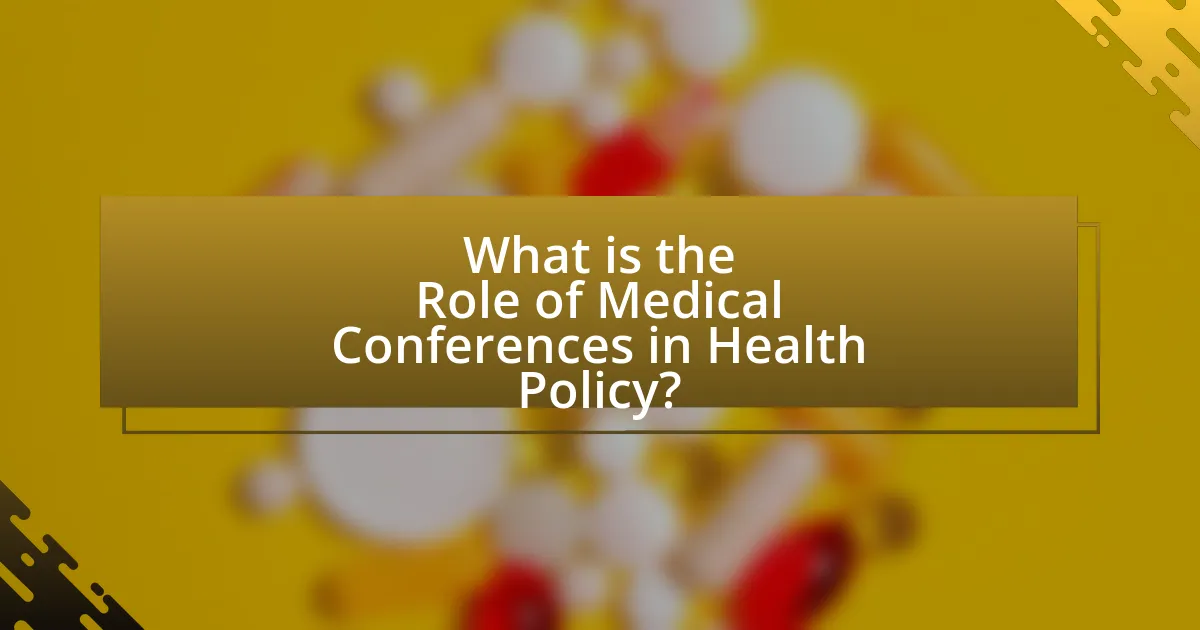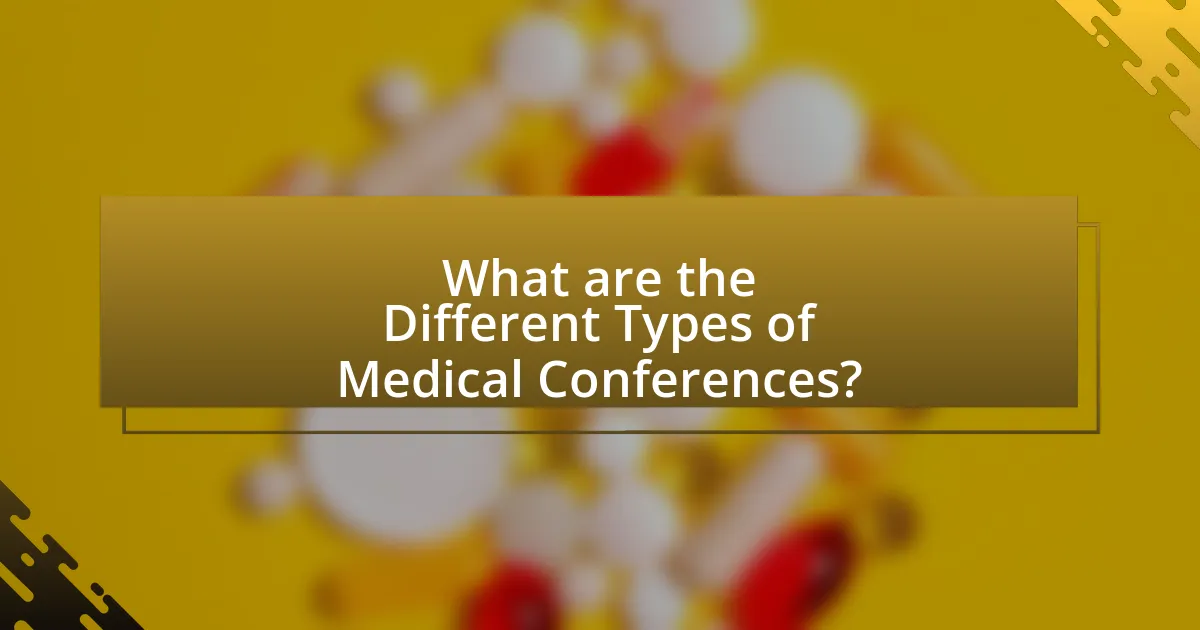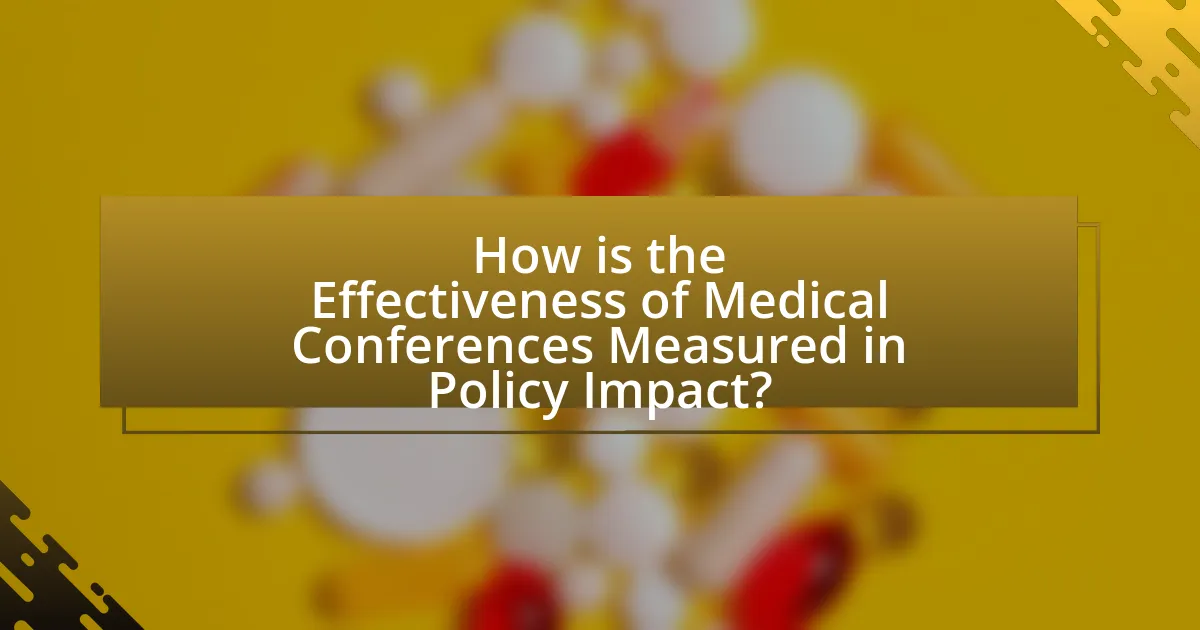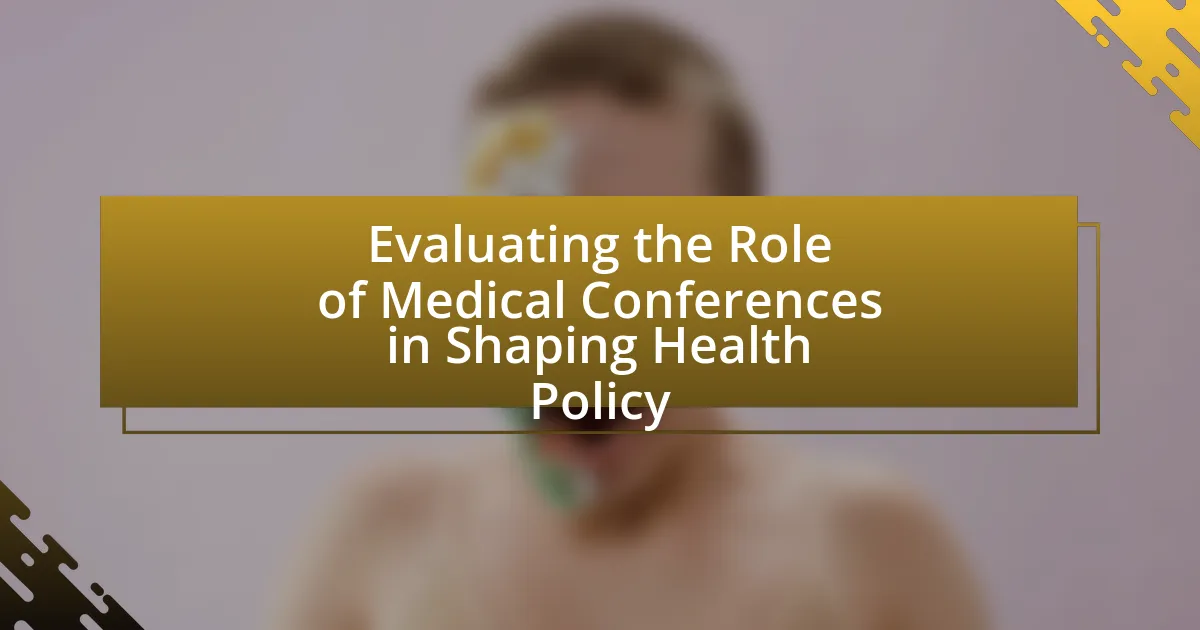Medical conferences are pivotal in shaping health policy by facilitating knowledge exchange among healthcare professionals, policymakers, and stakeholders. These events serve as platforms for discussing emerging health issues, evaluating existing policies, and proposing evidence-based solutions. Key components such as expert presentations, networking opportunities, and policy discussions significantly influence health policy decisions. Stakeholders actively engage in shaping policy through collaborative dialogues, while various types of conferences cater to specific health policy needs. The effectiveness of these conferences is measured through participant feedback, follow-up research, and the impact on policy changes, highlighting their essential role in the ongoing development of health policy.

What is the Role of Medical Conferences in Health Policy?
Medical conferences play a crucial role in shaping health policy by facilitating the exchange of knowledge, research findings, and best practices among healthcare professionals, policymakers, and stakeholders. These events provide a platform for discussing emerging health issues, evaluating current policies, and proposing evidence-based solutions. For instance, the World Health Organization often utilizes insights gained from medical conferences to inform global health strategies and guidelines. Additionally, conferences can influence legislative agendas by highlighting critical health challenges and mobilizing support for policy changes, as seen in the discussions surrounding the Affordable Care Act in the United States.
How do medical conferences influence health policy decisions?
Medical conferences influence health policy decisions by facilitating the exchange of research findings, expert opinions, and clinical practices among healthcare professionals and policymakers. These gatherings provide a platform for presenting new data, which can directly inform policy changes; for instance, the dissemination of evidence-based guidelines during conferences can lead to the adoption of new treatment protocols by health authorities. Additionally, networking opportunities at these events enable stakeholders to form collaborations that can advocate for specific health policies, as seen in initiatives like the World Health Organization’s Global Health Conference, where discussions have led to significant policy shifts in global health strategies.
What are the key components of medical conferences that impact policy?
The key components of medical conferences that impact policy include expert presentations, networking opportunities, and policy discussions. Expert presentations provide the latest research findings and clinical practices, which inform policymakers about current trends and evidence-based practices. Networking opportunities facilitate collaboration among healthcare professionals, researchers, and policymakers, fostering relationships that can lead to policy advocacy. Policy discussions at these conferences allow stakeholders to address pressing health issues, share insights, and propose actionable solutions, thereby influencing health policy decisions. These components collectively contribute to shaping health policy by disseminating knowledge, building alliances, and promoting dialogue among key stakeholders.
How do stakeholders participate in shaping health policy at these conferences?
Stakeholders participate in shaping health policy at conferences through active engagement in discussions, presentations, and networking opportunities. These interactions allow stakeholders, including healthcare professionals, policymakers, and industry representatives, to share insights, research findings, and best practices. For instance, the World Health Organization’s Global Health Conference facilitates dialogue among diverse stakeholders, leading to collaborative policy recommendations that address pressing health issues. This collaborative environment fosters the exchange of evidence-based information, which is crucial for informed decision-making in health policy development.
Why are medical conferences important for health policy development?
Medical conferences are important for health policy development because they facilitate the exchange of knowledge and best practices among healthcare professionals, policymakers, and researchers. These gatherings provide a platform for discussing emerging health issues, sharing research findings, and identifying gaps in current policies. For instance, the World Health Organization often utilizes insights from conferences to inform global health strategies, demonstrating how collective expertise can shape effective health policies. Additionally, conferences enable networking opportunities that can lead to collaborations aimed at addressing public health challenges, further reinforcing their significance in the policy-making process.
What unique opportunities do medical conferences provide for policymakers?
Medical conferences provide policymakers with unique opportunities to engage directly with healthcare professionals, researchers, and industry leaders, facilitating the exchange of innovative ideas and evidence-based practices. These events allow policymakers to gather insights on the latest medical advancements and public health challenges, which can inform their decision-making processes. For instance, conferences often feature presentations of cutting-edge research and case studies that highlight successful health interventions, enabling policymakers to adopt effective strategies in their jurisdictions. Additionally, networking opportunities at these conferences foster collaborations that can lead to the development of policies that are responsive to current healthcare needs and trends.
How do medical conferences facilitate collaboration among health professionals?
Medical conferences facilitate collaboration among health professionals by providing a structured environment for networking, knowledge sharing, and interdisciplinary dialogue. These events bring together diverse healthcare practitioners, researchers, and policymakers, enabling them to exchange ideas, discuss best practices, and collaborate on research initiatives. For instance, a study published in the Journal of Medical Internet Research found that 85% of attendees reported forming new professional relationships at conferences, which often lead to collaborative projects and partnerships. This collaborative atmosphere is essential for advancing health policy and improving patient care outcomes.

What are the Different Types of Medical Conferences?
Medical conferences can be categorized into several types, including scientific conferences, educational conferences, industry conferences, and specialty conferences. Scientific conferences focus on presenting new research findings and advancements in medical science, often featuring peer-reviewed presentations and discussions. Educational conferences aim to provide continuing medical education (CME) opportunities for healthcare professionals, enhancing their knowledge and skills. Industry conferences are organized by pharmaceutical or medical device companies to showcase their products and innovations, often including networking opportunities for professionals. Specialty conferences concentrate on specific fields or specialties within medicine, allowing experts to share insights and developments relevant to their area of expertise. Each type plays a crucial role in disseminating knowledge and influencing health policy.
How do various types of medical conferences cater to health policy?
Various types of medical conferences cater to health policy by providing platforms for dialogue among stakeholders, disseminating research findings, and influencing policy decisions. For instance, conferences such as the American Public Health Association Annual Meeting facilitate discussions on public health issues, allowing policymakers to engage with researchers and practitioners. Additionally, specialized conferences like the World Health Assembly focus on global health policies, enabling member states to negotiate and adopt resolutions that shape international health standards. These gatherings often feature presentations of empirical studies, which can inform evidence-based policy-making, as seen in the implementation of guidelines from the Centers for Disease Control and Prevention following discussions at relevant conferences.
What are the differences between academic, industry, and governmental conferences?
Academic, industry, and governmental conferences differ primarily in their objectives, audiences, and content focus. Academic conferences aim to disseminate research findings, foster scholarly discussion, and promote collaboration among researchers, often featuring peer-reviewed presentations and papers. Industry conferences focus on practical applications, networking, and showcasing innovations, targeting professionals and stakeholders in specific sectors, with an emphasis on market trends and product development. Governmental conferences concentrate on policy-making, regulatory issues, and public health initiatives, involving policymakers, public health officials, and stakeholders to discuss and shape health policies. These distinctions highlight the unique roles each type of conference plays in the broader context of health policy and professional development.
How do virtual conferences compare to in-person events in shaping policy?
Virtual conferences are increasingly effective in shaping policy compared to in-person events due to their broader accessibility and cost-effectiveness. Research indicates that virtual formats can attract a more diverse audience, including stakeholders who may not afford travel or time away from their responsibilities, thereby enhancing the range of perspectives in policy discussions. For instance, a study published in the Journal of Medical Internet Research found that virtual conferences increased participation by 30% compared to traditional in-person events, leading to a richer dialogue and more comprehensive policy recommendations. Additionally, the ability to record sessions and share materials online allows for ongoing engagement and reference, further solidifying the impact of virtual conferences on policy development.
What role do keynote speakers play in influencing health policy at conferences?
Keynote speakers play a crucial role in influencing health policy at conferences by setting the agenda and framing discussions around key issues. Their presentations often highlight emerging trends, research findings, and critical challenges in healthcare, which can shape the priorities of policymakers and stakeholders. For instance, a keynote address by a leading expert can catalyze dialogue on pressing health concerns, leading to actionable insights and recommendations that inform policy decisions. Studies have shown that influential speakers can sway audience perceptions and motivate collective action, thereby impacting the direction of health policy initiatives.
How do expert opinions shape discussions on health policy?
Expert opinions significantly shape discussions on health policy by providing evidence-based insights and recommendations that influence decision-making processes. These experts, often recognized leaders in their fields, contribute their knowledge during medical conferences, where they present research findings, share best practices, and engage in dialogue with policymakers. For instance, the World Health Organization frequently relies on expert panels to guide health policy initiatives, demonstrating how expert consensus can lead to the adoption of effective health strategies. Additionally, studies have shown that expert testimony can sway public opinion and legislative outcomes, underscoring the critical role these opinions play in shaping health policy discussions.
What impact do influential speakers have on attendee perspectives?
Influential speakers significantly shape attendee perspectives by providing authoritative insights and compelling narratives that can alter perceptions and drive engagement. Research indicates that speakers with established credibility and expertise can enhance the perceived importance of topics discussed, leading to shifts in attitudes and beliefs among attendees. For instance, a study published in the Journal of Health Communication found that presentations by respected figures in the medical field resulted in increased knowledge retention and a greater likelihood of adopting new practices among healthcare professionals. This demonstrates that the impact of influential speakers extends beyond mere information delivery; they actively influence the way attendees interpret and respond to health policy issues.

How is the Effectiveness of Medical Conferences Measured in Policy Impact?
The effectiveness of medical conferences in policy impact is measured through various metrics, including participant feedback, changes in clinical practice guidelines, and subsequent policy developments influenced by conference discussions. Research indicates that conferences often lead to the dissemination of new evidence-based practices, which can be tracked through follow-up surveys assessing changes in attendees’ knowledge and behavior. For instance, a study published in the Journal of Continuing Education in the Health Professions found that 70% of participants reported implementing new practices as a direct result of insights gained at conferences, demonstrating a tangible link between conference content and policy change. Additionally, the analysis of policy documents post-conference can reveal how discussions and recommendations are integrated into health policy frameworks, further validating the impact of these events.
What metrics are used to evaluate the success of medical conferences in shaping policy?
Metrics used to evaluate the success of medical conferences in shaping policy include participant engagement, policy impact assessments, and follow-up actions taken by attendees. Participant engagement can be measured through attendance numbers, session participation rates, and feedback surveys, which indicate the level of interest and involvement. Policy impact assessments involve analyzing changes in policy or practice that can be directly linked to discussions or resolutions made during the conference. Follow-up actions, such as the implementation of new guidelines or initiatives by attendees after the conference, serve as concrete evidence of the conference’s influence on health policy. These metrics collectively provide a comprehensive view of how effectively medical conferences contribute to shaping health policy.
How can attendee feedback contribute to assessing conference effectiveness?
Attendee feedback is crucial for assessing conference effectiveness as it provides direct insights into participant satisfaction and the relevance of the content presented. By collecting data on aspects such as session quality, speaker performance, and overall organization, organizers can identify strengths and weaknesses in the conference structure. For instance, a study published in the Journal of Medical Education highlighted that 85% of attendees reported that feedback mechanisms significantly influenced future programming decisions, demonstrating a clear link between attendee input and improved conference outcomes. This feedback loop allows for continuous enhancement of conference offerings, ensuring they meet the evolving needs of the medical community and contribute effectively to health policy discussions.
What role does follow-up research play in measuring long-term impact?
Follow-up research is essential in measuring long-term impact as it provides data on the sustained effects of interventions or policies discussed at medical conferences. This type of research allows for the assessment of changes in health outcomes, policy implementation, and practice modifications over time, thereby offering insights into the effectiveness and relevance of the conference content. For instance, studies have shown that follow-up evaluations can reveal whether the knowledge gained at conferences translates into improved patient care or policy changes, thus validating the initial objectives of the event.
How do medical conferences adapt to changing health policy landscapes?
Medical conferences adapt to changing health policy landscapes by incorporating current policy discussions into their agendas and facilitating dialogue among stakeholders. These conferences often feature sessions dedicated to emerging health policies, regulatory changes, and their implications for practice, ensuring that attendees are informed about the latest developments. For instance, the American Public Health Association’s Annual Meeting regularly includes workshops and panels that address recent legislative changes, allowing healthcare professionals to understand and respond to evolving policy environments. This approach not only enhances the relevance of the conference content but also fosters collaboration among policymakers, researchers, and practitioners, ultimately influencing health policy implementation and advocacy.
What strategies do organizers use to stay relevant in policy discussions?
Organizers use strategies such as fostering collaboration with key stakeholders, leveraging data-driven insights, and adapting to emerging trends to stay relevant in policy discussions. By engaging with policymakers, healthcare professionals, and community leaders, organizers ensure that diverse perspectives are included, which enhances the credibility and impact of their initiatives. Additionally, utilizing research and analytics allows organizers to present compelling evidence that supports their positions, making their contributions more persuasive. For instance, the integration of real-time data on health outcomes can inform policy recommendations, demonstrating the effectiveness of proposed changes. This approach not only keeps organizers at the forefront of discussions but also aligns their objectives with current health priorities, ensuring their relevance in the evolving landscape of health policy.
How do emerging health issues influence conference agendas?
Emerging health issues significantly influence conference agendas by prioritizing topics that reflect current public health challenges and research needs. For instance, the COVID-19 pandemic led to a surge in conferences focusing on infectious diseases, vaccine development, and public health responses, as evidenced by the rapid adaptation of major medical conferences like the American Public Health Association’s Annual Meeting, which shifted its focus to pandemic-related discussions in 2020. This responsiveness ensures that the agendas remain relevant and address pressing health concerns, thereby shaping health policy discussions and research funding priorities.
What Best Practices Can Enhance the Role of Medical Conferences in Health Policy?
Best practices that can enhance the role of medical conferences in health policy include fostering interdisciplinary collaboration, integrating patient perspectives, and utilizing technology for broader engagement. Interdisciplinary collaboration allows diverse stakeholders, such as healthcare professionals, policymakers, and researchers, to share insights and develop comprehensive health policies. Integrating patient perspectives ensures that policies reflect the needs and experiences of those affected, leading to more effective health outcomes. Utilizing technology, such as virtual platforms and social media, can expand participation and disseminate information widely, as evidenced by the increased attendance and engagement seen in hybrid conference models during the COVID-19 pandemic. These practices collectively strengthen the impact of medical conferences on health policy development.
How can organizers improve stakeholder engagement at conferences?
Organizers can improve stakeholder engagement at conferences by implementing interactive formats such as workshops, panel discussions, and networking sessions. These formats encourage active participation and facilitate dialogue among stakeholders, enhancing their involvement and investment in the conference outcomes. Research indicates that interactive sessions lead to higher satisfaction rates among participants, as evidenced by a study published in the Journal of Medical Education, which found that 85% of attendees preferred interactive formats over traditional lectures for fostering engagement.
What are effective ways to disseminate conference outcomes to policymakers?
Effective ways to disseminate conference outcomes to policymakers include creating concise policy briefs, utilizing social media platforms, and organizing targeted workshops. Policy briefs summarize key findings and recommendations, making it easier for policymakers to grasp essential information quickly. Social media platforms can amplify the reach of conference outcomes, engaging a broader audience and facilitating discussions. Targeted workshops allow for direct interaction between researchers and policymakers, fostering dialogue and clarifying complex issues. These methods enhance the likelihood that conference outcomes will influence health policy decisions.

Leave a Reply